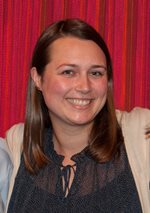Marit Aure, PhD, Shares 1st Place in World-Wide Dental Research Contest
 Postdoctoral associate Marit Aure, PhD, of the Center for Oral Biology in the Eastman Institute for Oral Health, tied for first place at the highly-competitive International Association for Dental Research/Johnson & Johnson Hatton Awards Competition held recently in Cape Town, South Africa.
Postdoctoral associate Marit Aure, PhD, of the Center for Oral Biology in the Eastman Institute for Oral Health, tied for first place at the highly-competitive International Association for Dental Research/Johnson & Johnson Hatton Awards Competition held recently in Cape Town, South Africa.
The judges determined that the science presented by Aure and Korea’s Joo-young Park, was exemplary in both projects, surpassing 36 other researchers from around the world in their category. This is the first time in IADR history that two first place winners were named, with no second place winner.
Aure had qualified for the international competition by earning second place in the American Association of Dental Research/Johnson & Johnson Hatton Awards Competition, held in Charlotte, North Carolina in March. For the international round of the competition, all participants were required to condense the research talk into a four-slide, 10-minute presentation to be given in front of three judges.
“Telling the whole story in 10 minutes and four slides was especially challenging,” said Aure, who said the poker-faced judges had some very tough questions. “My reaction to winning was a mix of surprise, excitement and joy! It feels really good to get positive feedback and exposure for the salivary research we’re doing.”
 Aure, who works in the lab of Catherine Ovitt, PhD, associate professor in Biomedical Genetics in EIOH’s Center for Oral Biology, presented “Mechanisms of Acinar Cell Maintenance in the Adult Murine Salivary Gland,” which revealed that replacement of cells in the salivary gland depends primarily on the duplication of the secretory cells, rather than on stem cells. The outcome of this work is important for designing a strategy to repair damaged salivary glands, as it indicates this may be accomplished by using healthy salivary gland cells for transplant therapy. Park’s research involved the genetic basis for cervical lymph node enlargement.
Aure, who works in the lab of Catherine Ovitt, PhD, associate professor in Biomedical Genetics in EIOH’s Center for Oral Biology, presented “Mechanisms of Acinar Cell Maintenance in the Adult Murine Salivary Gland,” which revealed that replacement of cells in the salivary gland depends primarily on the duplication of the secretory cells, rather than on stem cells. The outcome of this work is important for designing a strategy to repair damaged salivary glands, as it indicates this may be accomplished by using healthy salivary gland cells for transplant therapy. Park’s research involved the genetic basis for cervical lymph node enlargement.
Aure and Park, who each won $1,600, competed in the Senior Basic Science Category, where entrants must be enrolled in a post-dental, post-graduate, or Ph.D. program or have performed the unpublished research submitted to the competition within three years of earning a PhD. All the meeting abstracts will be featured in a special edition of the Journal of Dental Research online.
Aure completed her undergraduate, master’s and PhD degrees in her native Norway. She met Ovitt a few years ago at a Gordon conference on Salivary Glands where she was presenting her PhD research.
“Marit’s background training and her research interests made her a great postdoctoral candidate, and I invited her to apply for a position with us,” Ovitt said. “She came from Norway to join my laboratory after completing her PhD, and has put enormous effort into this project over the past two and a half years. We are thrilled with her accomplishments – both at the bench and in the competitions! Her results not only change the way we think about the renewal of salivary glands, but they also serve as the basis for a new R01 application just submitted to NIDCR, which proposes to follow the fate of acinar cells after radiation treatment.”
The International Association for Dental Research, headquartered in Alexandria, Va. is a nonprofit organization with more than 11,500 members worldwide. Its mission is to advance research and increase knowledge for the improvement of oral health worldwide, to support and represent the oral health research community; and to facilitate the communication and application of research findings.

